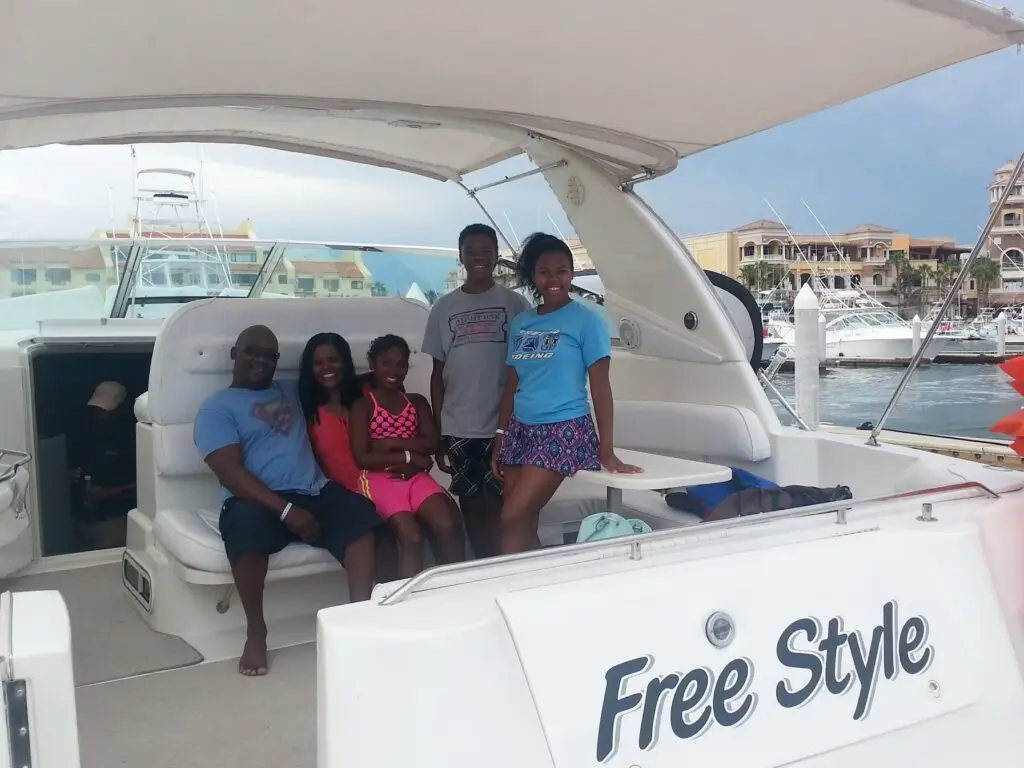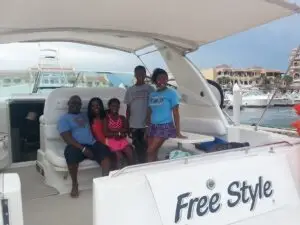When my husband, Earl, and I embarked on our 10-day honeymoon cruise from San Juan, Puerto Rico to the Southern Caribbean, we had no idea we were setting sail on a lifelong journey that would shape not only our lives but the lives of our children too.
One night, as we sat hand-in-hand on our Princess cruise ship balcony, watching the enormous sea stretched out before us, we made a pact to explore the world together and plant the seeds of that passion in our kids.
Fast forward about two decades, and I can confidently say that decision was one of the best we’ve ever made.
Our three young adult children –– Aziza, Jakada, and Alexis –– have now visited destinations throughout the Caribbean and North America, Central and South America, Europe, and Africa.
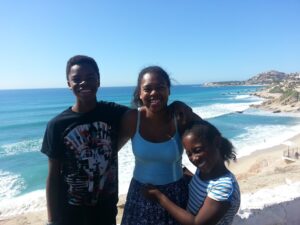
Thanks to crisscrossing the world –– from Angola to Athens, Brazil to Belize, and beyond –– they’ve grown into curious, college-educated, compassionate global citizens, each carving their unique path in life with a perspective broadened by travel.
Acknowledging Our Privilege
I recognize that my family is in the minority when it comes to our overseas travel exploits. Travel is a privilege and often inaccessible due to financial reasons, work, family obligations, and more. This is especially true for African-American families like ours.
According to the U.S. State Department, as of December 2023, just 48% of Americans had a valid passport. By the end of 2024, the percentage of U.S. passport holders rose to 51%.

African Americans tend to travel overseas less frequently than their white counterparts in the United States. A Pew Research Center study found that only 49% of Black Americans have ever traveled abroad, compared to 75% of White Americans. White adults are also more likely to have visited multiple countries, with 30% having been to five or more countries, compared to 13% of Black adults.
A prior backlog of passport applications and COVID restrictions no doubt kept many people from traveling in recent years. But with the pandemic under much more control, and the State Department recently launching a new online passport renewal system to make it faster and easier to access passport services, now is the perfect time to get a passport, and see the world if possible. (Renew your passport online at Travel.State.Gov/renewonline).
Discovering New Places, Cultures and Experiences
While raising our children, we didn’t just spring for international outings. There were many domestic trips too, showing the kids the importance of experiencing different places and cultures –– as well as appreciating America and a few foreign destinations that became often-visited family favorites.
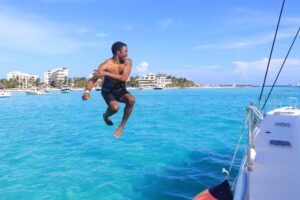
Typically, when stateside, we took advantage of timeshare deals to make travel more affordable for our family of five. We often traveled in late summer or shoulder seasons when air and hotel prices were cheaper. Sometimes, we watched our budget by forgoing costly flights altogether, taking memorable road trips instead to areas like Smugglers Notch, VT, and Massanutten, VA.
But most of our family travel was to warmer locations throughout Mexico and the Caribbean, a chance to get away from the cold and snow in the East Coast town where we previously lived, Mountainside, NJ.

One family vacation in 2008 truly ignited the travel bug in our kids; it also typified the inevitable ups and downs of travel.
We’d set out for an end-of-August trip to Orlando, Florida, which we thought would be full of outdoor fun, sun, and time at the hotel pool. Instead, we experienced seven days of nonstop rain. It wasn’t a complete disaster; just not what any of us anticipated.
Unbeknownst to our children, however, Earl and I had also booked a second week of travel that year to the Bahamas. So instead of dropping us off at the airport to head back home, our taxi (yes, this was pre-Uber) pulled up to a dock at Port Canaveral.
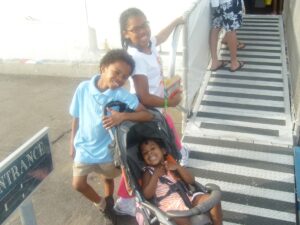
It took a moment to register, but our children’s faces transformed from confusion to sheer delight as they realized we were about to board the massive Carnival Sensation cruise ship. Their squeals of excitement still echo in my ears to this day.
From that moment on, travel became an integral part of our family’s DNA.
Exploring Life Beyond America’s Shores
From the sun-soaked beaches of Cabo and Cancun to the vibrant streets of Montego Bay, Jamaica, we have enjoyed showing our children the fun, beauty, and different aspects of life beyond our borders.
As parents, we always believed that travel is an excellent form of education and that exposing our children to diverse cultures would foster empathy, understanding, and a broader worldview. We wanted them to see past the confines of their small neighborhood and understand that the world was vast, varied, and waiting to be explored.
Our travels weren’t just about sightseeing. We made a point to support local communities, practice our Spanish language skills, and appreciate the environment too.
We also wanted our kids to understand that travel is about connection –– with people, with nature, with history. I’ll never forget our family exploring Mayan ruins and swimming in cenotes (caves) in Tulum.
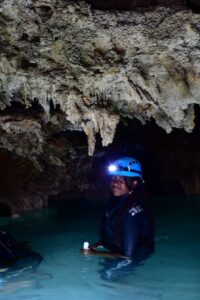
Likewise, the memory of Alexis petting sea turtles in Curacao is etched in my brain.
The impact of these experiences on our children has been profound.
Fostering Freedom and Food Appreciation
I believe that traveling early in life is one reason all three of our children felt free enough and quite comfortable going out of state to college. That’s far from the norm in America, where only 15-20% of college students attend out-of-state institutions, according to the National Center for Education Statistics.
Our eldest, Aziza, is now 27 years old and earned her Bachelor’s degree in 2018.
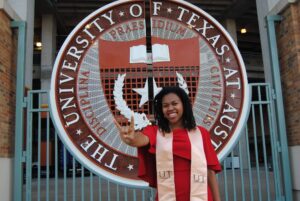
While a Marketing student at the University of Texas at Austin, she met her future husband, Jacob, an Engineering student. Like we did in our family, Jacob’s parents provided him with opportunities to travel, and he’d been to India and Japan, among other places.
Aziza and Jacob married in 2020 and together they’ve taken up the mantle of global exploration with gusto, visiting such far-flung places as Machu Picchu in Peru, and Malta in the Mediterranean.
Their honeymoon in Hopkins, Belize was an adventure they’ll never forget. In Central America, they faced technology challenges and rain that dampened the streets, but not their spirits. One text Aziza sent me summarized her feelings of gratitude through it all: “We have extremely limited cell service (and only on my phone) and the WiFi is spotty at best. But we are here and having a great time!” her message said.
Aziza and Jacob’s 2023 trip to Greece wasn’t just about romantic sunsets in Santorini; it was also about diving deep into the local culture, in places like Athens and Heraklion (Crete). To immerse themselves in a region, they take cooking classes wherever they travel, and have learned to recreate the flavors of Greece, Italy, and Turkey in their own kitchen, everything from homemade yogurt to stuffed pepper dishes and desserts.

In 2024, they spent nearly two weeks exploring Nice and the South of France.
Their travels have further instilled in them a sense of global responsibility. Back home in Austin, they’re active volunteers in their church, bringing the spirit of community they’ve experienced worldwide to their local congregation.
Promoting Art, Culture, and Social Justice
At 24, our son Jakada is using travel as a way to pursue his passion for the creative arts. Jakada graduated in 2022 from North Carolina State University with a degree in Industrial Design.

In 2023, he left Raleigh, NC to join ResiliArt Angola, an initiative sponsored by the American Schools of Angola and UNESCO to use art as a tool for cross-cultural understanding and peace-building on the African continent. While in Luanda, the capital of Angola, Jakada met the President of Angola, taught schoolchildren art, was interviewed by various media outlets, and held his first solo art exhibit.
More recently, during a trip to Bahia, Brazil in 2024, he further honed his Portuguese language skills, expanded his global network, and created a commemorative art banner for the pre-meeting conference of the 9th Pan African Congress.
Jakada recently completed an artist-in-residence role for an international paint company. Inspired by his world travels, he’s also developing an idea for an art preservation initiative that would promote and preserve traditional African art forms. Watching him confidently speak Portuguese and discuss his art and social interests, I realize how far he’s come from being that wide-eyed (and temporarily seasick) boy on his first cruise so many years ago.
Our youngest daughter, Alexis, has traveled the most with us. Alexis, 19, has seen poverty and privilege during our travels to places such as Trinidad and the Dominican Republic.
As a freshman at North Carolina A&T State University, an HBCU in Greensboro, NC, she’s acutely aware of the advantages her travels have afforded her. Many of her peers have never left their state, let alone the country. (They’re not alone. A 2019 survey by OnePoll revealed that about 11% of Americans have never traveled outside of their home state.
This realization has further fueled Alexis’s passion for social and economic justice and her desire to become a lawyer.

The recipient of a prestigious four-year undergraduate fellowship from A&T’s Center of Excellence for Social Justice, Alexis volunteers in her college community and looks forward to studying abroad, likely in Latin America, in her junior year.
Embracing Challenges and Diversity in the World
As parents, watching our children embrace the world in their unique ways has been incredibly rewarding. We’ve seen them navigate foreign cities with confidence; communicate across language barriers, even if that meant speaking “Spanglish” or using language apps; and approach unfamiliar situations with open minds and hearts.
Case in point: when traveling in parts of Greece and Turkey, Aziza was initially surprised (and mildly perturbed) by signs inside bathrooms requesting that people not throw toilet paper in the toilet.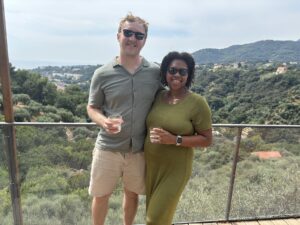
She later came to understand this is common in the region’s older buildings or areas with less advanced plumbing systems. Thus the practice isn’t just aimed at minimizing blockages; it’s also a sustainability measure, designed to reduce the environmental impact on local water and sewage systems.
Our children have now crossed oceans, traversed continents, and immersed themselves in cultures and conditions vastly different from their own. I was thrilled when Jakada, while in Angola, was able to serendipitously venture on to Lagos, Nigeria, and Ile Ife in Osun state, where he was graciously hosted by a local Yoruba King.
Developing a Mindset of Gratitude and Resilience
But it’s not just about the stamps on their passports or the languages they’ve picked up. It’s about the mindset they’ve developed. They have learned to see beyond stereotypes, question their assumptions and approach differences with curiosity rather than fear. As an interracial couple that just had their first child, this is particularly important for Aziza and Jacob as they embark on their next phase of life together.

Furthermore, contrary to what some might suspect, all this travel has not turned our kids into “spoiled” or indulgent individuals.
Although my husband and I offered to purchase each of our children’s cars, Jakada declined. Our son said he wanted to work, save money, and buy a vehicle on his own. So while in college, he got a part-time job, pocketed his earnings, and purchased a 2002 Chevrolet Monte Carlo for $3,500 in cash. In Brazil, where Jakada footed the bill for his trip, he spent most of his stay at hostels, including one where he shared a single room outfitted with four sets of triple bunk beds that accommodated 12 (yes 12!) people.
Jakada didn’t complain about it though. He said it wasn’t that bad because his hostel room “technically wasn’t at capacity since there were only seven people in there.”
Besides, he appreciated the cosmopolitan group – his hostel mates hailed from all across Brazil, as well as Argentina, Australia, and Germany – and the rock-bottom room price too.
“Can’t beat 40 reals (less than $10) a night,” he said, referring to the Brazilian currency.
Thanks to their forays into the world, our kids also know that travel can be a lot like the rest of life: messy, disruptive, and unpredictable.
They’ve learned resilience from missed connections, plane delays, lost luggage, and more. When I asked Jakada how many airports he’s slept at due to travel snafus, he ticked off Dubai, London, Los Angeles, and Lome, Togo.
Our children have sharpened problem-solving skills by navigating foreign public transportation systems as well. They’ve developed adaptability from trying new foods and adjusting to different cultural norms.
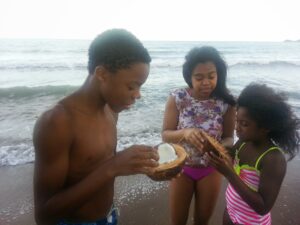
Most importantly, they’ve learned that despite our differences, there’s a common thread of humanity that connects us all. Whether it’s eating fresh coconut and sharing a meal with locals at a small fishing village in Naguabo, Puerto Rico, or bargaining in a bustling market in Istanbul, our children have seen firsthand that kindness and respect are universal languages.
As Earl and I reflect on our decision to raise global citizens, we’re filled with gratitude. We’re grateful for the privilege of being able to travel, for the experiences we’ve shared as a family, and for the thoughtful young adults our children have become.
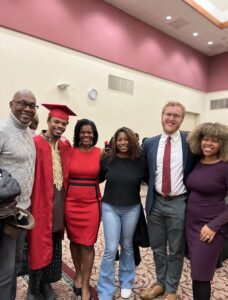
Mark Twain once said, “Travel is fatal to prejudice, bigotry, and narrow-mindedness.” In giving our children the gift of travel, we’ve granted them access to a broader, richer, more compassionate worldview. And in my book, that’s the greatest gift of all.
Resources
- U.S. State Department statistics on U.S. passport holders
- Pew Research Study on Americans who have traveled abroad
- State Department announcement about new online passport renewal system
- National Center for Education Statistics data on out-of-state college students
- Where are Students Moving to Attend College
- OnePoll study on Americans who haven’t traveled, as described in Forbes
- UNESCO info on the ResiliArt initiative in Luanda, Angola

